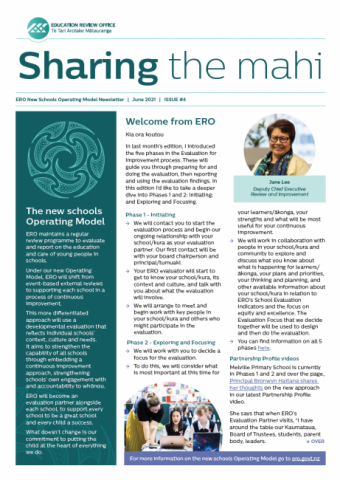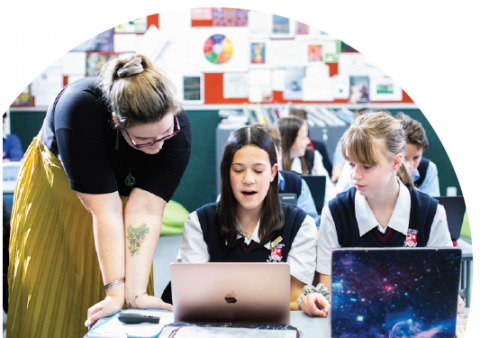
The new schools Operating Model
ERO maintains a regular review programme to evaluate and report on the education and care of young people in schools.
Under our new Operating Model, ERO will shift from event-based external reviews to supporting each school in a process of continuous improvement.
This more differentiated approach will use a developmental evaluation that reflects individual schools’ context, culture and needs.
It aims to strengthen the capability of all schools through embedding a continuous improvement approach, strengthening schools’ own engagement with and accountability to whānau.
ERO will become an evaluation partner alongside each school, to support every school to be a great school and every child a success.
What doesn’t change is our commitment to putting the child at the heart of everything we do.
Welcome from ERO
Kia ora koutou
In last month’s edition, I introduced the five phases in the Evaluation for Improvement process. These will guide you through preparing for and doing the evaluation, then reporting and using the evaluation findings. In this edition I’d like to take a deeper dive into Phases 1 and 2: Initiating; and Exploring and Focusing.
Phase 1 - Initiating
We will contact you to start the evaluation process and begin our ongoing relationship with your school/kura as your evaluation partner. Our first contact will be with your board chairperson and principal/tumuaki.
Your ERO evaluator will start to get to know your school/kura, its context and culture, and talk with you about what the evaluation will involve.
We will arrange to meet and begin work with key people in your school/kura and others who might participate in the evaluation.
Phase 2 - Exploring and Focusing
We will work with you to decide a focus for the evaluation.
To do this, we will consider what is most important at this time for your learners/ākonga, your strengths and what will be most useful for your continuous improvement.
We will work in collaboration with people in your school/kura and community to explore and discuss what you know about what is happening for learners/ākonga, your plans and priorities, your thinking and planning, and other available information about your school/kura in relation to ERO’s School Evaluation Indicators and the focus on equity and excellence. The Evaluation Focus that we decide together will be used to design and then do the evaluation.
You can find information on all 5 phases here.

Partnership Profile videos
Melville Primary School is currently in Phases 1 and 2 and over the page, Principal Bronwyn Haitana shares her thoughts on the new approach in our latest Partnership Profile video.
She says that when ERO’s Evaluation Partner visits, “I have around the table our Kaumataua, Board of Trustees, students, parent body, leaders.
“It’s not always something that we do as a school … to have everyone round the table at the same time”.
Having an Evaluation Partner has given the school an opportunity to share the combined voice. “It is so valuable to sit around the table and talk about student learning and student wellbeing as a collective – it couldn’t have been more powerful. One of the things our kaumatua said (about the Evaluation Partner) was ‘I forgot, you’re just one of us’. If you have someone of that esteem in our community saying ‘you’re just one of us’, that says a lot about the partnership that the Evaluation Partner has built. From then on, because we’ve had that trusting relationship, we’ve been able to really move forward with the evaluation.”
I hope you find these profile videos, and these newsletters, useful. More information is available on our website.
Ngā mihi
Jane Lee
Deputy Chief Executive Review and Improvement
Partnership profile
“I’ve been through quite a few ERO processes in the past and found them quite daunting – a scary experience. I’m excited to see that a key part of the new model is building trusted relationships. I actually enjoy the days that ERO visits (now), and I enjoy someone helping me to think indepth about what’s happening for us and our students and our achievements.” Watch the video here.
- Melville Primary School Principal Bronwyn Haitana
Introducing ERO’s Regional Director Te Tai Pūtahi Nui (Central)

The Central Te Tai Pūtahi Nui Region runs from south of the Bombays/Pukekohe all the way down to Levin, and covers both the east and west coasts and everything in between - including the central plateau.
Phil Cowie leads a team of 40 evaluators and five managers to provide highly-effective external evaluation for the schools and early learning services in the region.
As an evaluator himself, Phil is committed to supporting schools and services in the region to provide the best possible education and care for children and young people. Ko te Tamaiti te Pūtake o te Kaupapa (The Child - the Heart of the Matter) is the driving force for Te Tai Pūtahi Nui.
Before joining ERO in 2011, Phil worked in the primary school sector as a teacher and principal in schools in Hawke’s Bay, the Waikato and King Country.
Your feedback matters
ERO’s approach will continue to be iterative as all schools are introduced to the new approach.
The feedback from your school and ERO evaluation partner will contribute to the development of the model. Please share your feedback directly with your Evaluation Partner.
Resources
- A Go-To-Guide on the new Operating Model is available for you to download and print: New-schools-Operating-Model-Your-Go-to-Guide-5.pdf (ero.govt.nz)
- A slide pack on ERO’s new approach to school evaluations is available for your presentations here: OM-website-slides-2020.pdf (ero.govt.nz)
- The School Self Audit and Assurance Statement resource is available here: The School Self Audit and Assurance Statement: A New Approach | Education Review Office (ero.govt.nz)
New Evaluation Approach FAQs
What is the new evaluation approach?
ERO maintains a regular review programme to evaluate and report on the education and care of young people in schools. Under our new approach, ERO will shift from event-based external reviews to supporting each school in a process of continuous improvement.
The new approach aims to complement your school’s own internal evaluation, strategic and annual planning and reporting approach, and to strengthen schools’ own engagement with and accountability to whānau.
ERO will become an evaluation partner alongside each school, to support every school to be a great school and every child a success.
What doesn’t change is our commitment to putting the child at the heart of everything we do.
What role does ERO play in this new approach?
ERO is shifting to a more developmental approach to evaluation, supporting each school’s improvement over time.
An ERO evaluation partner will work alongside each school. The evaluation partner will build a professional relationship with each school over time.
ERO’s evaluation role will connect with each school’s strategic planning and reporting cycle as part of an ongoing improvement journey. ERO is supporting schools to build and sustain high-quality evaluation as part of your planning for improvement focus.
Consideration of a school within its wider network and community is woven throughout the new Operating Model, which will also identify an opportunity to undertake evaluations at a community level.
What is an Evaluation Partner?
An ERO Evaluation Partner will be assigned to work with a school’s Board, Principal and Leadership Team. They will have an ongoing relationship and work with your school over time.
The evaluation process will be collaborative and respond to the school context.
At the completion of an evaluation for improvement phase, your school and ERO will work together to report and plan key actions and next steps in your school’s improvement journey.
How and when are schools onboarded?
Schools are being brought into the new approach progressively, starting at the beginning of each Term and throughout 2021 and 2022. Each school will receive a letter from ERO advising when it is due to join the new approach.
Decisions on when each school is brought into the model are systematically planned within each ERO region and include factors such as the timing of a school’s most recent review and our internal resourcing.
How will ERO work with each school?
Our approach is to build trust and confidence in the new Operating Model and in ERO by engaging the sector in working out how best to be make the model work in practice.
Your school will understand:
- The advantages the new model will deliver
- The main features, and how they differ from what ERO has done previously.
We will work with each school to refine and operationalise the new model, so that it can be introduced with the least disruption.
What is informing ERO’s approach?
A collaborative approach: we will work with each school to strengthen its systems, plans and practices through evaluation.
A tailored approach: understanding each school’s individual contexts, culture, strengths and needs.
A flexible approach: we will work with each school to ensure the way the model works is practical and can be refined and improved over time.
A targeted approach: to allow ERO to direct more resource into working with the schools that will benefit most and to focus more on system evaluation and improvement.
An evidence-informed approach: that focuses on the things that we know from research and practice make the biggest difference, and that ensure schools are better supported to monitor and assess the impacts.
How is ERO gathering feedback?
ERO is working to support improvement in each school and in the system as a whole. We want to ensure that the intent and main features of the new approach are widely understood and our staff are working hard around the country to listen and act on feedback received.
We have engaged with more than 1500 principals and senior leaders on this new approach. We have ensured that key sector stakeholder groups are working with us to deliver successful implementation.
Our approach will continue to be iterative as all schools are progressively introduced to the new model throughout 2021 and 2022.
Some feedback so far includes:
“A promising start and a good concept. Finally, I will be able to tell my school’s story in full.”
“Collaboration, differentiation and linking everything to our strategic goals is pure genius.”
“New approach to evaluation and building relationships over time and school-led will prove beneficial in improving outcomes.”
“Really like the idea.”
The feedback from your school and ERO evaluation partner will contribute to the development of the model.
What is ERO’s commitment to the sector?
ERO is committed to supporting improved outcomes and achieving equity for all learners, particularly Māori and priority learners. The principles that underpin the new model give priority to the principles of the Treaty of Waitangi through a focus on partnerships to achieve desired outcomes.
The model has a focus on understanding the cultural context of each school in order to best serve its needs. By building differentiation into the model, we have given ourselves the flexibility to work with the wider community where it is desired and appropriate. We’re committed to continuing to work with the sector.
In partnership with each school, ERO is working to support improvement in the school and in the system as a whole.
We’d like to earn broad support for the new model and an enthusiasm for its implementation.
We’re keen to understand sticking points or concerns so they can be addressed early and efficiently.
We are committed to continuing to work with the sector and hopeful that it sees the opportunity, value and the potential that the new model will deliver.
Information on our website
- An overview of the new approach
- A handy reference guide
- Schools that have joined the model
- Newsletter updates
- Videos of participating principals
Sharing the mahi: A partnership model
At ERO, we look forward to working with you. We want to ensure that we are effective partners, adding value to each school’s improvement journey.
We share an obligation to put the learner at the centre, to equity and excellence in outcomes for all learners, and an understanding that quality education is a right for every New Zealand learner.
We welcome this opportunity to collaborate with you so that together, we can make a positive difference for all learners. We thank you for your commitment to supporting the successful implementation of this new approach.
For more information on the new schools Operating Model go to ero.govt.nz